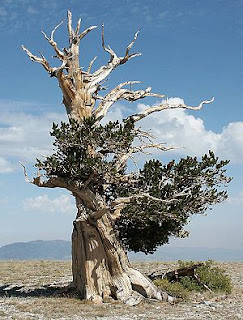
Some of the oldest living things on the Earth are Bristlecone pines. Many that are alive today were alive during the time of Christ. This is hard to imagine. There are some animals that live 150 years, but that's a long time for a tree. So there must be something unique and special about these trees, but above all, they should be preserved.
I recently heard the same story described in two totally different contexts. Apparently, the oldest tree on Earth was discovered when a researcher studying Bristlecone pines was using a drill to extract a little core sample on one. The drill broke off inside the tree. The drill was valuable, so he cut the tree down to extract it. Later, when they got the tree sample back to the laboratory, they counted the rings and found it to be about 4,900 years old. It was a record by about 300 years.
Now reports are coming out that the trees are being attacked by insect, and many populations of the trees are in jeopardy. The trees exist mainly in mountainous regions, and there are populations in California and Colorado. They tend to exist in little groves in high, dry rugged areas. The ones in California live longer, and are genetically different than the ones in Colorado, but they are essentially the same kind of tree.
200 years ago, there was an beetle introduced into the eastern United States from Europe. Since that time, it has been slowly sweeping west. That, in addition to a fungus called the pine blister rust, has reached Colorado and is starting to effect Bristlecones in the state.
I listened to this report in a Science podcast. They were discussing the fact that the Bristlecones are being studied by scientists to find out why they live so long. They noted that these trees survive mainly in harsher environments. Little water, winds, high altitude which results in more sun exposure. This rougher life, this harsher existence equals a longer life. This is similar to what you hear about in humans. Recent studies have revealed that strict caloric reductions result in longer life. That which doesn't kill you makes you strong?
Our science is almost to the point where we can decode genetics and determine how the Bristlecone is able to live so long. Those genes might be useful to enhance other species to help them survive. We are also almost to the point where we could put together a defense for the Bristlecones. I suppose that's optimistic. It's one thing to be able to do something, it's another thing entirely to have the resources to make it happen.


No comments:
Post a Comment